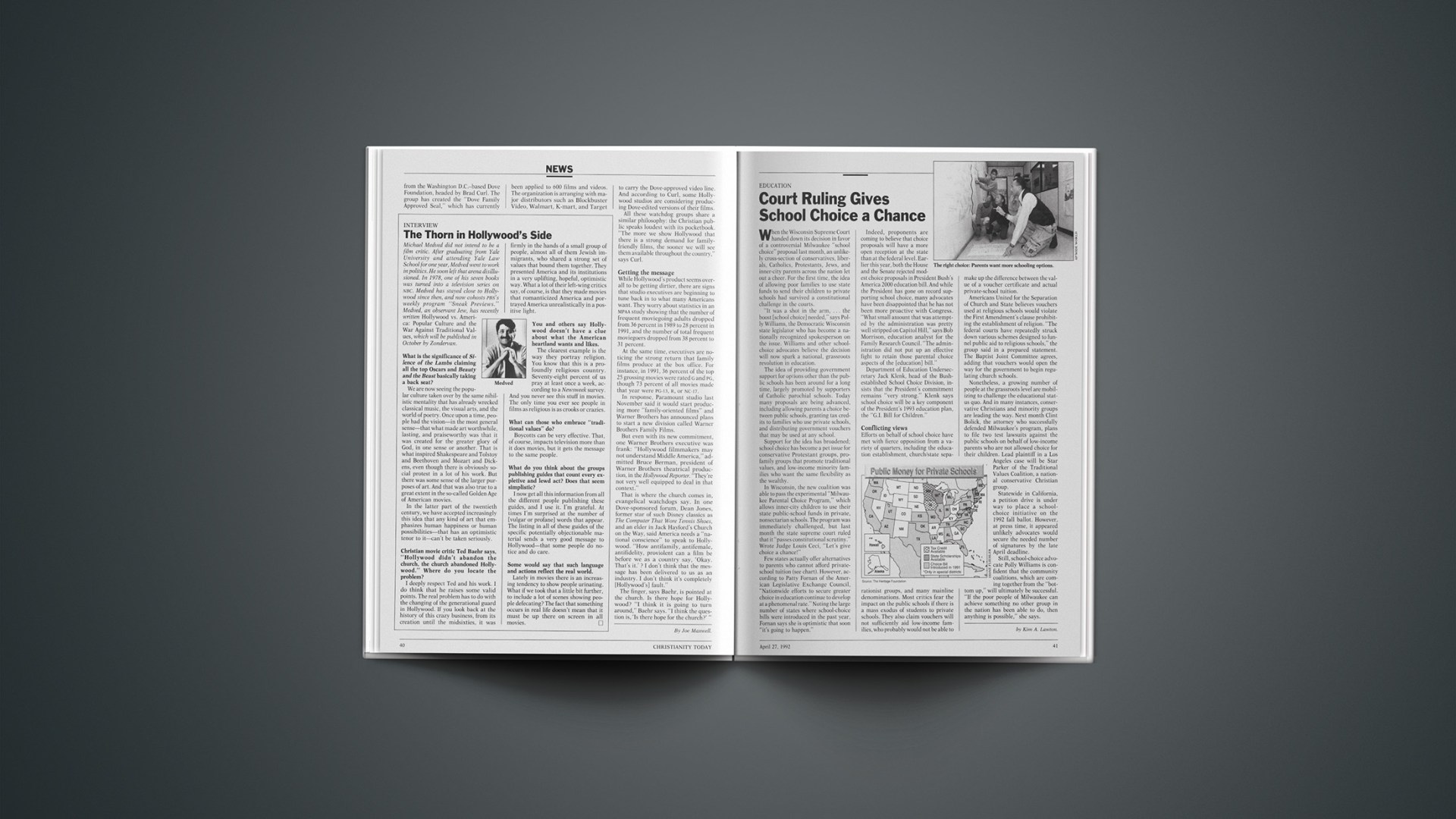When the Wisconsin Supreme Court handed down its decision in favor of a controversial Milwaukee “school choice” proposal last month, an unlikely cross-section of conservatives, liberals, Catholics, Protestants, Jews, and inner-city parents across the nation let out a cheer. For the first time, the idea of allowing poor families to use state funds to send their children to private schools had survived a constitutional challenge in the courts.
“It was a shot in the arm, … the boost [school choice] needed,” says Polly Williams, the Democratic Wisconsin state legislator who has become a nationally recognized spokesperson on the issue. Williams and other school-choice advocates believe the decision will now spark a national, grassroots revolution in education.
The idea of providing government support for options other than the public schools has been around for a long time, largely promoted by supporters of Catholic parochial schools. Today many proposals are being advanced, including allowing parents a choice between public schools, granting tax credits to families who use private schools, and distributing government vouchers that may be used at any school.
Support for the idea has broadened; school choice has become a pet issue for conservative Protestant groups, pro-family groups that promote traditional values, and low-income minority families who want the same flexibility as the wealthy.
In Wisconsin, the new coalition was able to pass the experimental “Milwaukee Parental Choice Program,” which allows inner-city children to use their state public-school funds in private, nonsectarian schools. The program was immediately challenged, but last month the state supreme court ruled that it “passes constitutional scrutiny.” Wrote Judge Louis Ceci, “Let’s give choice a chance!”
Few states actually offer alternatives to parents who cannot afford private-school tuition (see chart). However, according to Patty Fornan of the American Legislative Exchange Council, “Nationwide efforts to secure greater choice in education continue to develop at a phenomenal rate.” Noting the large number of states where school-choice bills were introduced in the past year, Fornan says she is optimistic that soon “it’s going to happen.”
Indeed, proponents are coming to believe that choice proposals will have a more open reception at the state than at the federal level. Earlier this year, both the House and the Senate rejected modest choice proposals in President Bush’s America 2000 education bill. And while the President has gone on record supporting school choice, many advocates have been disappointed that he has not been more proactive with Congress. “What small amount that was attempted by the administration was pretty well stripped on Capitol Hill,” says Bob Morrison, education analyst for the Family Research Council. “The administration did not put up an effective fight to retain those parental choice aspects of the [education] bill.” Department of Education Undersecretary Jack Klenk, head of the Bush-established School Choice Division, insists that the President’s commitment remains “very strong.” Klenk says school choice will be a key component of the President’s 1993 education plan, the “G.I. Bill for Children.”
Conflicting Views
Efforts on behalf of school choice have met with fierce opposition from a variety of quarters, including the education establishment, church/state separationist groups, and many mainline denominations. Most critics fear the impact on the public schools if there is a mass exodus of students to private schools. They also claim vouchers will not sufficiently aid low-income families, who probably would not be able to make up the difference between the value of a voucher certificate and actual private-school tuition.
Americans United for the Separation of Church and State believes vouchers used at religious schools would violate the First Amendment’s clause prohibiting the establishment of religion. “The federal courts have repeatedly struck down various schemes designed to funnel public aid to religious schools,” the group said in a prepared statement. The Baptist Joint Committee agrees, adding that vouchers would open the way for the government to begin regulating church schools.
Nonetheless, a growing number of people at the grassroots level are mobilizing to challenge the educational status quo. And in many instances, conservative Christians and minority groups are leading the way. Next month Clint Bolick, the attorney who successfully defended Milwaukee’s program, plans to file two test lawsuits against the public schools on behalf of low-income parents who are not allowed choice for their children. Lead plaintiff in a Los Angeles case will be Star Parker of the Traditional Values Coalition, a national conservative Christian group.
Statewide in California, a petition drive is under way to place a school-choice initiative on the 1992 fall ballot. However, at press time, it appeared unlikely advocates would secure the needed number of signatures by the late April deadline.
Still, school-choice advocate Polly Williams is confident that the community coalitions, which are coming together from the “bottom up,” will ultimately be successful. “If the poor people of Milwaukee can achieve something no other group in the nation has been able to do, then anything is possible,” she says.
by Kim A. Lawton.










